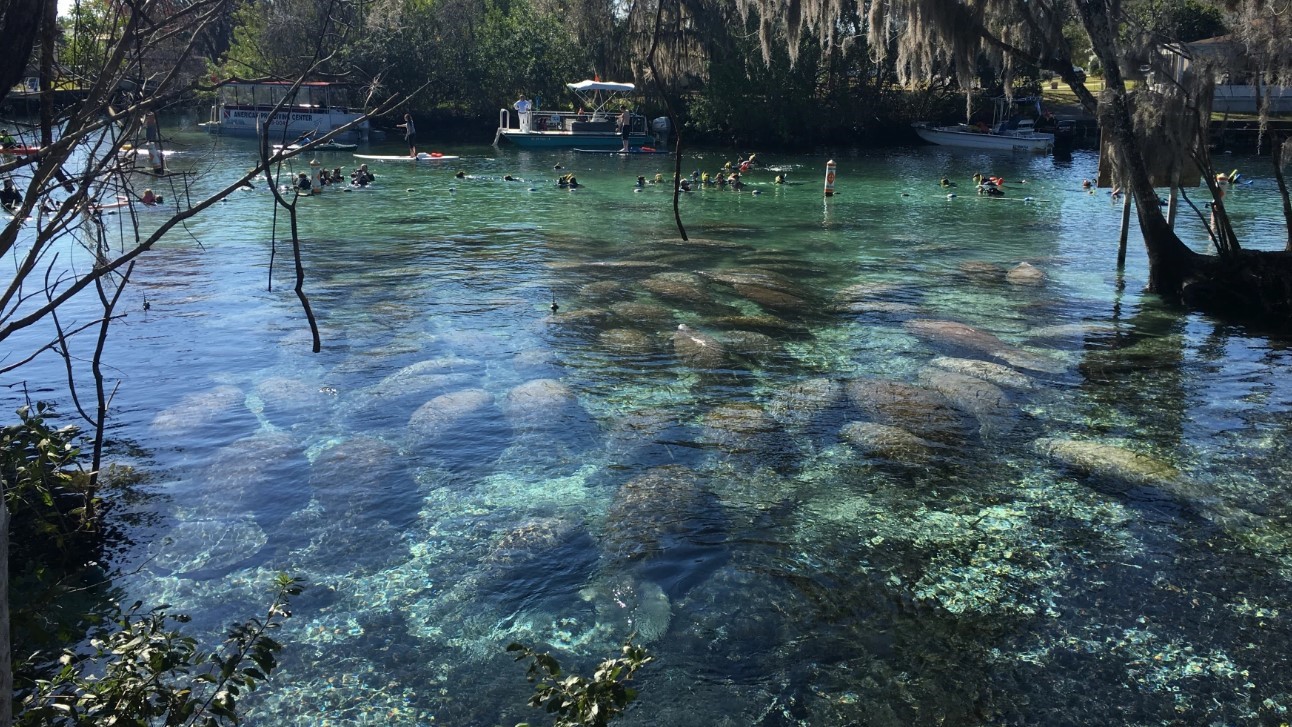Manatees and tourists crowd the Three Sisters Spring at Crystal River, Florida, on a cold morning. | Courtesy Thomas Pluckhahn
Published on January 3, 2025 at 9:57 am
Free local news and info, in your inbox at 6 a.m. M-F. Sign up for the Jacksonville Today newsletter.
A state report shows more than 500 manatees died in Florida waters in 2024.
The gentle sea cows are listed as threatened. But their numbers are far higher now than they have been historically.
That’s the conclusion from a new report co-authored by Thomas Pluckhahn, a professor of anthropology at the University of South Florida, in the journal Plos One.
Results from archaeological digs have shown few manatee bones in Native American settlements in Florida.
“We pulled about 70 reports of archeological excavations which had kind of more detailed analysis of vertebrate animal bones, and reviewed those that included manatees,” said Pluckhahn, “and essentially found none.”
There were also few historical reports of manatees dating from Spanish, French and English colonists, he noted.
Global cooling might be the reason.
Cooler temperatures lasting until the late 1800s likely prevented the cold-sensitive sea cows from migrating north from the West Indies, said Pluhkahn.
“Because of cooler temperatures, especially with what’s called the Little Ice Age, which was intervals of cold that started about 1200 and continued even into the 1800s, and we know that manatees have trouble with the cold today,” he said, “and we know that the climate is warmer today than it has been at any point in the last 10,000 years or so.”
READ MORE: Florida manatees may be returning to the endangered species list. Here’s why.
The manatees probably began migrating from the West Indies when the climate started heating up, beginning at the end of the 19th century with the onset of the Industrial Revolution.
“Archeologists do find manatee remains, at least in some quantities, on Spanish colonial sites in the Caribbean, and they also show up some in Native American sites in the Caribbean,” said Pluhkahn. “But they’re not mentioned by the Spanish. And the Spanish and the French were curious about Native American hunting and fishing.
“A lot of those Europeans were actually starving. A lot of times they were in Florida, people like (Hernando) de Soto — who landed in Tampa Bay in 1539 — he had an army of, like, 600 people, so they were constantly in search of food. So the lack of mentions of manatees, to me, seemed conspicuous.”
 But remains of manatees have been found in Florida that are about ancient — when the weather was much warmer.
“Fossils are common in Florida because Florida was underwater 50 million years ago, and so the fossilized bones — you know, they’re essentially like rocks — are pretty common,” Pluckhahn said, “but the unfossilized bones that you’d expect from human settlement in the last 10,000 years, are extremely rare.”
And even though there are probably more manatees alive recently than there were in the past, Pluckhahn said, the dangers they face remain. In addition to cold snaps, boat propeller scars and collisions with marine vessels are common.
Other threats continue, such as pollution and algae blooms, which killed over 1,000 manatee a few years ago when seagrass beds in the Indian River Lagoon were smothered by algae.
The state’s manatee population is between 8,350 to 11,730, according to the Florida Fish and Wildlife Conservation Commission. That’s enough that in 2017 they were reclassified from endangered to threatened under the federal Endangered Species Act.
“The manatee was delisted from endangered to threatened a few years back, and they haven’t done so well since then,” said Pluckhahn. “So we don’t want this to be used to justify delisting manatees. We think the lesson here is that humans have kind of created this environment that’s favorable with humans. And I think rather than excusing us from taking care of them, I think it obligates us more to take care of them.”
But remains of manatees have been found in Florida that are about ancient — when the weather was much warmer.
“Fossils are common in Florida because Florida was underwater 50 million years ago, and so the fossilized bones — you know, they’re essentially like rocks — are pretty common,” Pluckhahn said, “but the unfossilized bones that you’d expect from human settlement in the last 10,000 years, are extremely rare.”
And even though there are probably more manatees alive recently than there were in the past, Pluckhahn said, the dangers they face remain. In addition to cold snaps, boat propeller scars and collisions with marine vessels are common.
Other threats continue, such as pollution and algae blooms, which killed over 1,000 manatee a few years ago when seagrass beds in the Indian River Lagoon were smothered by algae.
The state’s manatee population is between 8,350 to 11,730, according to the Florida Fish and Wildlife Conservation Commission. That’s enough that in 2017 they were reclassified from endangered to threatened under the federal Endangered Species Act.
“The manatee was delisted from endangered to threatened a few years back, and they haven’t done so well since then,” said Pluckhahn. “So we don’t want this to be used to justify delisting manatees. We think the lesson here is that humans have kind of created this environment that’s favorable with humans. And I think rather than excusing us from taking care of them, I think it obligates us more to take care of them.”
 But remains of manatees have been found in Florida that are about ancient — when the weather was much warmer.
“Fossils are common in Florida because Florida was underwater 50 million years ago, and so the fossilized bones — you know, they’re essentially like rocks — are pretty common,” Pluckhahn said, “but the unfossilized bones that you’d expect from human settlement in the last 10,000 years, are extremely rare.”
And even though there are probably more manatees alive recently than there were in the past, Pluckhahn said, the dangers they face remain. In addition to cold snaps, boat propeller scars and collisions with marine vessels are common.
Other threats continue, such as pollution and algae blooms, which killed over 1,000 manatee a few years ago when seagrass beds in the Indian River Lagoon were smothered by algae.
The state’s manatee population is between 8,350 to 11,730, according to the Florida Fish and Wildlife Conservation Commission. That’s enough that in 2017 they were reclassified from endangered to threatened under the federal Endangered Species Act.
“The manatee was delisted from endangered to threatened a few years back, and they haven’t done so well since then,” said Pluckhahn. “So we don’t want this to be used to justify delisting manatees. We think the lesson here is that humans have kind of created this environment that’s favorable with humans. And I think rather than excusing us from taking care of them, I think it obligates us more to take care of them.”
But remains of manatees have been found in Florida that are about ancient — when the weather was much warmer.
“Fossils are common in Florida because Florida was underwater 50 million years ago, and so the fossilized bones — you know, they’re essentially like rocks — are pretty common,” Pluckhahn said, “but the unfossilized bones that you’d expect from human settlement in the last 10,000 years, are extremely rare.”
And even though there are probably more manatees alive recently than there were in the past, Pluckhahn said, the dangers they face remain. In addition to cold snaps, boat propeller scars and collisions with marine vessels are common.
Other threats continue, such as pollution and algae blooms, which killed over 1,000 manatee a few years ago when seagrass beds in the Indian River Lagoon were smothered by algae.
The state’s manatee population is between 8,350 to 11,730, according to the Florida Fish and Wildlife Conservation Commission. That’s enough that in 2017 they were reclassified from endangered to threatened under the federal Endangered Species Act.
“The manatee was delisted from endangered to threatened a few years back, and they haven’t done so well since then,” said Pluckhahn. “So we don’t want this to be used to justify delisting manatees. We think the lesson here is that humans have kind of created this environment that’s favorable with humans. And I think rather than excusing us from taking care of them, I think it obligates us more to take care of them.”
Copyright 2025 WUSF 89.7



